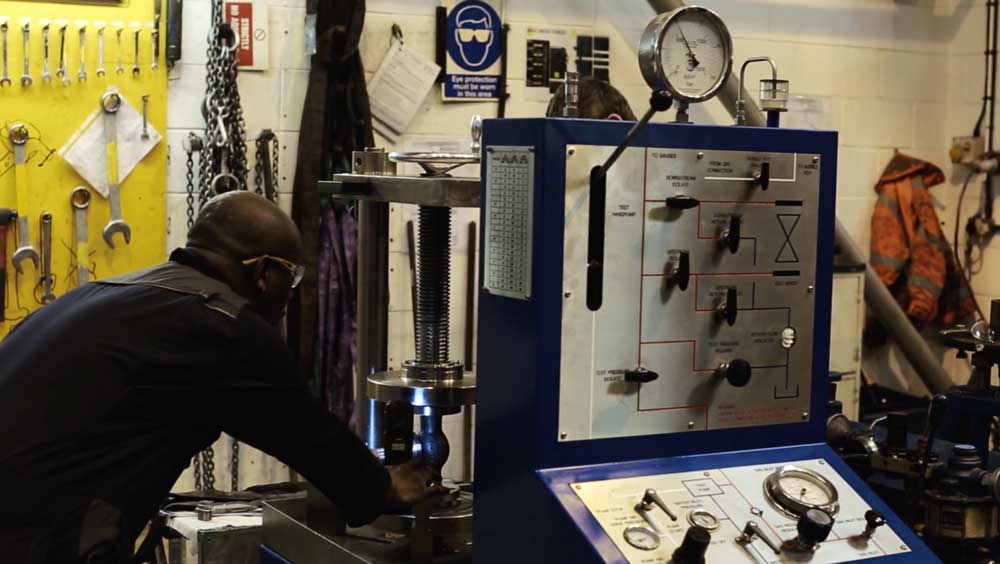Blackhall News
Preparing for a hydrogen economy

What does a hydrogen economy mean for the UK? Are we equipped for it? Are the government's targets for a Net Zero economy by 2050 truly feasible? Blackhall Engineering Managing Director, James Blackhall, gives his own insights into all of the above, exploring what the transition means for the Blackhall team of Valvologists and the product lines we have become known for industry-wide.
The UK government has set out plans to decarbonise all sectors of the UK economy in order to meet our Net Zero target by 2050. This necessarily means not merely a shift, but a gradual landslide away from our current reliance on fossil fuels. Hydrogen will play a key part. In fact, I believe that without it we will struggle to meet the demand for energy, which is set to double by 2040!
<> So, what is a hydrogen economy? Defined as “an industrial system in which the dominant role of the energy carrier and fuel is performed by hydrogen together with electricity” (from Encyclopaedia of Electrochemical Power Sources, 2009), a hydrogen economy would see the use of hydrogen to decarbonise economic sectors which are hard to electrify. Good examples would be transport and aviation, where liquid fuels are necessary to power the heavy vehicles. In its liquid form, hydrogen is a viable replacement to traditional fuels generated from oil. It's also completely clean to burn, producing only water vapour as a by-product.
So, what is a hydrogen economy? Defined as “an industrial system in which the dominant role of the energy carrier and fuel is performed by hydrogen together with electricity” (from Encyclopaedia of Electrochemical Power Sources, 2009), a hydrogen economy would see the use of hydrogen to decarbonise economic sectors which are hard to electrify. Good examples would be transport and aviation, where liquid fuels are necessary to power the heavy vehicles. In its liquid form, hydrogen is a viable replacement to traditional fuels generated from oil. It's also completely clean to burn, producing only water vapour as a by-product.However, it's important to understand that its cleanliness as an energy source relies on its position within the 'hydrogen rainbow'. The hydrogen rainbow, or 'spectrum', includes four key 'colours', each of which refers to a different method of production. Starting with green, as you might expect, this is the cleanest form of hydrogen, produced with no harmful greenhouse gas emissions. In fact, it's made using clean electricity from surplus renewable energy sources, like solar or wind power, to electrolyse water. At present, green hydrogen makes up a small percentage of UK energy, because the production is so expensive.
Turquoise is a new entry in the hydrogen colour charts, and is made via a process called methane pyrolysis, which produces both hydrogen and solid carbon. Dependent on the thermal process being powered with renewable energy, and of course on the carbon being permanently stored or used, turquoise hydrogen may, in the future, be valued as a low-emission hydrogen, and likely as a 'bridge' from the use of fossil fuels to renewable energies.
Blue Hydrogen is produced, for the most part, from natural gas, via a process called steam reformation that brings together natural gas and heated water to produce hydrogen. The output also includes carbon dioxide, which means that in order to minimise emissions, carbon capture and storage are essential.
Grey is currently the most commonly produced form of hydrogen, made using the same methods as blue hydrogen, only without the capture of greenhouse gases.
Other colours in the spectrum include black and brown, which use coal and are therefore the most environmentally damaging, as well as white, which is a naturally occurring geological form of hydrogen that's created through fracking. Red, pink and violet are produced using electrolysers driven by nuclear power, while yellow hydrogen is produced from a mixture of renewable energies and fossil fuels.
 Clearly, if hydrogen is to play its part in the government's plans to achieve Net Zero by 2050, we need to be producing it as cleanly as possible. And ideally as cheaply as possible, too, which is where I believe pink hydrogen, made from nuclear fusion, will become the most prolific 'colour' of the rainbow. Being the same process that powers the stars, if nuclear fusion can be successfully recreated here on Earth, it opens up the potential for virtually limitless supplies of low-carbon, low-radiation energy. In the meantime, I believe it's more likely that we'll achieve our targets via a balanced 'arsenal' of energy sources; it would be unrealistic to suggest that hydrogen production can be completely green, at least in the short term. It's expensive, and there simply isn't enough renewable energy currently available in order to produce the volumes of it that we need. What's more likely, is that a balance of 'colours', including green, but also others with greater emissions, is what will enable the transition towards a hydrogen economy.
Clearly, if hydrogen is to play its part in the government's plans to achieve Net Zero by 2050, we need to be producing it as cleanly as possible. And ideally as cheaply as possible, too, which is where I believe pink hydrogen, made from nuclear fusion, will become the most prolific 'colour' of the rainbow. Being the same process that powers the stars, if nuclear fusion can be successfully recreated here on Earth, it opens up the potential for virtually limitless supplies of low-carbon, low-radiation energy. In the meantime, I believe it's more likely that we'll achieve our targets via a balanced 'arsenal' of energy sources; it would be unrealistic to suggest that hydrogen production can be completely green, at least in the short term. It's expensive, and there simply isn't enough renewable energy currently available in order to produce the volumes of it that we need. What's more likely, is that a balance of 'colours', including green, but also others with greater emissions, is what will enable the transition towards a hydrogen economy.
Even if we take it as read that nuclear fusion will be commercially developed, or that there will, at a given point in the future, be enough renewable energy available to solely manufacture green hydrogen, there is also the issue of infrastructure that needs to be overcome. Hydrogen fuel is stored in effectively the same way as LPG gas, and so we would need to invest more heavily into that type of storage to make it more widely available, for example, in the world of transport. The UK Hydrogen Strategy, as laid out by the government and published in August last year, suggests that “hydrogen is likely to be fundamental to achieving net zero in transport, potentially complementing electrification across modes of transport such as buses, trains and HGVs”. It also suggests that it is likely to provide solutions for sectors that will not otherwise be able to be fully decarbonised, including aviation and shipping. This is because low-carbon hydrogen can provide an alternative to petrol, diesel and kerosene, and can be used directly in combustion engines, fuel cells and turbines. In industries such as haulage and public transport, centralised refuelling hubs make the creation of infrastructure relatively easy. However, the document recognises that “the longer-term role for hydrogen in transport decarbonisation is not yet clear [and that] key challenges in this area include technology uncertainty [and] lack of existing hydrogen infrastructure.”
So where do we come in? Part of our ethos here at Blackhall is to be part of a shift towards a clean, renewable and plentiful supply of energy, which ties in with creating a greener planet. We have already begun to reduce our own reliance on natural resources, and as the government looks to upscale its commitment to, and investment in, the hydrogen economy, we feel that their plans tie really well with our own vision for the future. Part of our mission statement is that we would like to drive our business to generate 50% of its revenue from new products and services over the next five years, and these include our new hydrogen valve. It's very ambitious; at present, we are supplying hydrogen valves into China and the USA, into more conventional plants, but it's a good start. We have also developed a range specifically for the hydrogen market, which is essentially an evolution of our liquefied natural gas (LNG) valves and our cryogenic valves, taking the basic cryogenic valve and enhancing it with our hazardous chemical valve technology that guarantees absolutely no leakage into the environment. Our zero-emission technology is world-beating, and I believe that we are the first company globally to incorporate it into a hydrogen valve range. In fact, there is no current standard for hydrogen valves, so we regard ourselves to be at the forefront of that technology.

In terms of its application, our technology could be used both within the manufacturing process of hydrogen, as well as within its transportation to the end user. If the hydrogen economy mirrors the liquefied gas industry, where you have plants that make the hydrogen via conventional methods, our range could be used for its manufacture. And if that's the case, and the fuel needs to be transported by tankers to the forecourt, or via a pipeline, again, our product range would fit into the hydrogen distribution network. If, on the other hand, hydrogen is to be generated side-by-side a power station that's using the energy to split water into oxygen and hydrogen, again, you're somehow going to have to store the gas and the hydrogen. This could be in battery or tank form, but in either case, you would need our technology for the flow and control of the hydrogen.
In short, while the UK's Hydrogen Strategy is still in its early stages, with the ranges that we have in place and the expertise our Valvologists bring to the table, I am convinced that Blackhall Engineering will be a front runner in the national and, indeed, global transition towards a hydrogen powered economy.